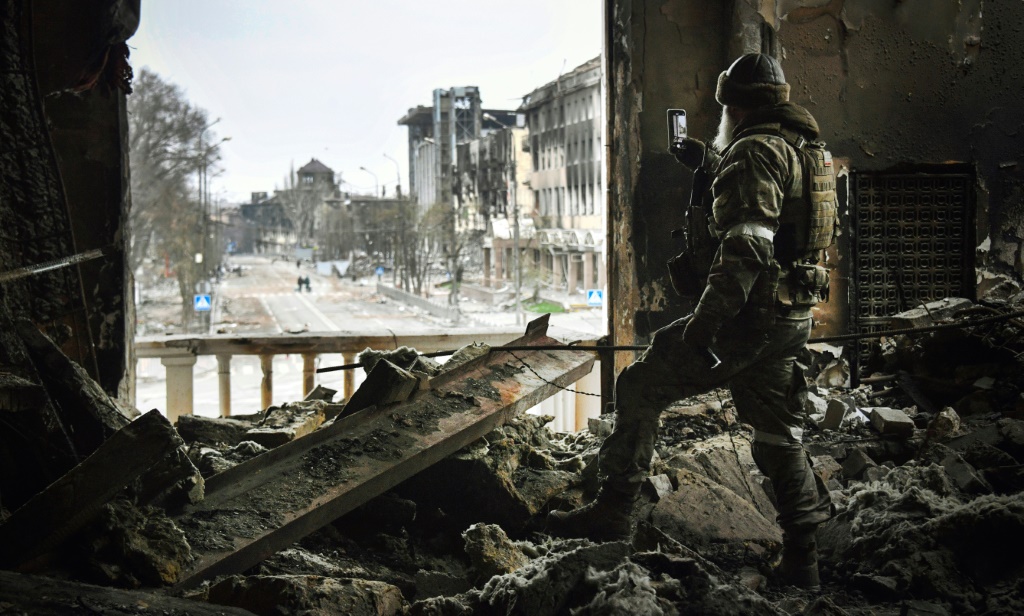War in Ukraine: from Russia's invasion to EU candidacy

Source: AFP
PAY ATTENTION: Click “See First” under the “Following” tab to see YEN.com.gh News on your News Feed!
Russia invaded Ukraine in the early hours of February 24, setting off the worst conflict in Europe in decades.
As EU members agree to make Ukraine a candidate for membership of the bloc, we look back on four months of fighting that have killed tens of thousands of civilians and destroyed entire cities.
February 24: Russia invades
Russian President Vladimir Putin announces a "special military operation" to "demilitarise" and "de-Nazify" the former Soviet state and protect Russian speakers there.
A full-scale invasion starts with air and missile strikes on several cities. Ukrainian President Volodymyr Zelensky pledges to stay in Kyiv to lead the resistance.
February 26: Massive sanctions
The West adopts unprecedented sanctions against Russia and offers Ukraine military aid.
PAY ATTENTION: Follow us on Instagram - get the most important news directly in your favourite app!
Air spaces are closed to Russian aircraft and Russia is kicked out of sporting and cultural events.
February 27: Nuclear threat
Putin puts Russia's nuclear forces on high alert, in what is seen as a warning to the West not to intervene in Ukraine.
February 28: First talks
During the first peace talks between Kyiv and Moscow, Russia demands recognition of its sovereignty over Crimea, the "demilitarisation" and "de-Nazification" of Ukraine and a guarantee Ukraine will never join NATO. Ukraine demands a complete Russian withdrawal.
March 3: Kherson falls
Russian troops attack Ukraine's south coast to try to link up territory held by pro-Moscow rebels in eastern Ukraine with the Russian-annexed Crimea peninsula.
On March 3, Kherson in the south becomes the first city to fall. Russian forces relentlessly shell the port of Mariupol.
March 4: Media crackdown
Russia passes a law punishing what it calls "fake news" about its offensive -- such as referring to its "special military operation" as an invasion -- with up to 15 years in prison.
March 16: Mariupol theatre razed
Russian air strikes raze a Mariupol theatre, killing an estimated 300 people sheltering inside. Moscow blames the attack on Ukraine's nationalist Azov battalion.
March 16: Zelensky lobbies Congress
Zelensky tells the US Congress to "remember Pearl Harbor" as he lobbies one Western parliament after another via video-link for weapons to fight Russia's advance.
April 2-3: Horror in Bucha
After a month of fighting, Russia withdraws from northern Ukraine, announcing it will focus its efforts on conquering the eastern Donbas region.
On April 2 and 3, Ukrainians find dozens of corpses of civilians scattered on the street or buried in shallow graves in the Kyiv suburb of Bucha, which Russian forces had occupied.
Moscow dismisses accusations of Russian war crimes, saying the images of the bodies are fakes.
April 8: Train station carnage
A rocket attack on a train station in the eastern city of Kramatorsk kills at least 57 civilians being evacuated from the Donbas.
April 12: Biden speaks of 'genocide'
Biden accuses Russia of "genocide", saying Putin appears intent on "trying to wipe out the idea of even being able to be a Ukrainian".
April 14: Flagship sinks
Ukrainian missiles hit and sink Russia's missile cruiser Moskva in the Black Sea, a major setback for Moscow.
May 11: $40 billion in US aid
US lawmakers back a huge $40-billion package of military, economic and humanitarian aid for Ukraine.
May 16: Kharkiv retreat
Ukraine says its troops have driven Russian forces back from the outskirts of the country's second-largest city, Kharkiv, to the Russian border.
May 18: Sweden, Finland apply to NATO
Finland and Sweden apply to join NATO, reversing decades of military non-alignment because of Russia's invasion of Ukraine.
May 23: First war crimes conviction
A Ukrainian court finds a 21-year-old Russian soldier guilty of war crimes and hands down a life sentence for shooting dead a 62-year-old civilian in northeastern Ukraine in the opening days of the war. He has appealed.
May 21: Battle for Mariupol ends
Russia declares it is in full control of Mariupol after Ukraine ordered troops holding out for weeks in the Azovstal steelworks to lay down their arms to save their lives.
Nearly 2,500 soldiers surrender and are taken prisoner by Russia.
May 30: EU bans most Russian oil
EU leaders overcome resistance from Hungary to agree a partial ban on most Russian oil imports as part of a sixth wave of sanctions.
The deal bans oil imports delivered by tanker but allows landlocked countries such as Hungary to continue receiving Russian oil by pipeline.
May 31: Russia seizes part of eastern city
After weeks of bombardments Russian troops seize part of the key eastern Ukrainian city of Severodonetsk.
June 9: Britons, Moroccan sentenced to death
Two British citizens and a Moroccan who were captured by Russian troops while fighting for Ukraine are sentenced to death by pro-Russian separatists.
Aiden Aslin and Shaun Pinner of Britain and Brahim Saadun of Morocco are accused of acting as mercenaries. Britain says they are members of the Ukrainian army and should be treated as prisoners of war.
June 12: Ukraine loses central Severodonetsk
The Ukrainian army says it has been driven from the centre of Severodonetsk. The fight continues at a chemical plant, where hundreds of civilians are sheltering.
June 23: EU grants Ukraine candidate status
The leaders of the 27-member European Union agree to accept Ukraine and neighbouring Moldova as candidates for EU membership.
Zelensky hails Ukraine's EU candidacy status as "historic".
PAY ATTENTION: check out news exactly for YOU ➡️ find "Recommended for you" block and enjoy!
Source: AFP





